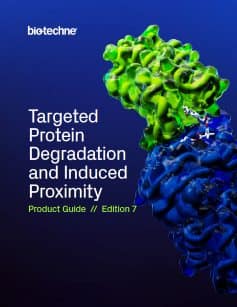LYTAC Building Blocks
LYTAC Building Blocks provide an advanced starting point for LYTAC development. LYTAC (LYsosome TArgeting Chimera) molecules are a new approach to Targeted Protein Degradation, which direct an extracellular protein of interest to the lysosome for degradation. LYTACs are heterobifunctional molecules comprising a recruiting molecule for a target protein (e.g. an antibody) joined by a linker to a ligand for a cell surface receptor, such as the cation-independent mannose-6-phosphate receptor (CI-M6PR) or the asialoglycoprotein receptor (ASGPR). The LYTAC forms a ternary complex with the protein of interest and the receptor, triggering internalization of the target protein via endocytosis and its subsequent lysosomal degradation.
Building Blocks |
|
| Cat. No. | Product Name / Activity |
|---|---|
| 7780 | β-GalNAc-PEG4-Azide |
| Asialoglycoprotein receptor ligand with PEG4 linker and azide group for onward chemistry | |
| 7635 | tri-GalNAc biotin |
| Biotinylated ASGPR ligand for LYTAC research and development | |
| 7401 | tri-GalNAc COOH |
| Asialoglycoprotein receptor ligand with PEG linker and carboxylic acid group for onward chemistry | |
| 7781 | tri-GalNAc-C5-amine |
| Asialoglycoprotein receptor ligand with alkylC5 linker and amine group for onward chemistry | |
| 8015 | tri-GalNAc-PEG3-Azide |
| Asialoglycoprotein receptor ligands with PEG3 linker and azide group for onward chemistry | |
Other |
|
| Cat. No. | Product Name / Activity |
| 8828 | Angiopep-2 |
| Binds to LRP1 and facilitates receptor-mediated transcytosis of cargo across the BBB | |
| 8829 | TransMoDE 3 Biotin |
| Biotinylated angiopep-2, induces internalization and degradation of streptavidin in brain cell lines | |
| 7901 | tri-GalNAc-C5-AF647 |
| Fluorescent asialoglycoprotein receptor ligand | |
Literature for LYTAC Building Blocks
Tocris offers the following scientific literature for LYTAC Building Blocks to showcase our products. We invite you to request* your copy today!
*Please note that Tocris will only send literature to established scientific business / institute addresses.
TPD and Induced Proximity Research Product Guide
This brochure highlights the tools and services available from Bio-Techne to support your Targeted Protein Degradation and Induced Proximity research, including:
- Active Degraders
- TAG Degradation Platform
- Degrader Building Blocks
- Assays for Protein Degradation
- Induced Proximity Tools
Targeted Protein Degradation Poster
Degraders (e.g. PROTACs) are bifunctional small molecules, that harness the Ubiquitin Proteasome System (UPS) to selectively degrade target proteins within cells. They consist of three covalently linked components: an E3 ubiquitin ligase ligand, a linker and a ligand for the target protein of interest. Authored in-house, this poster outlines the generation of a toolbox of building blocks for the development of Degraders. The characteristics and selection of each of these components are discussed. Presented at EFMC 2018, Ljubljana, Slovenia

